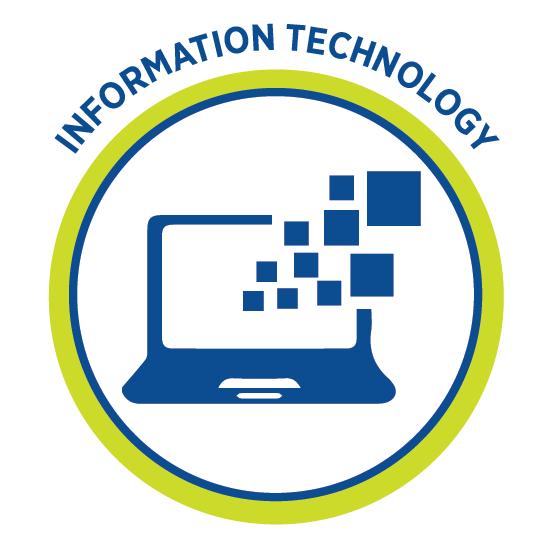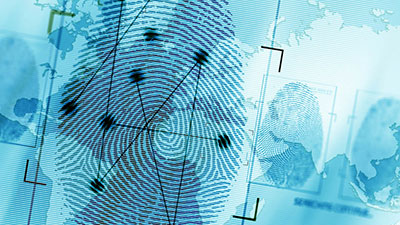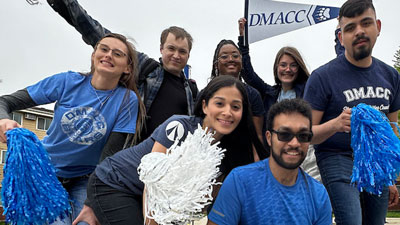Information Technology Academic Pathway
Questions? Contact us.
DMACC
Information Technology Pathway
itpathway@dmacc.edu
800-362-2127
Visit DMACC

Information Technology
Develop, Investigate, Connect, Secure, Code
The Information Technology pathway translates your passion for computers, computer languages, and computer systems to an in-demand career. You could work with computers and other technology to solve problems or learn the latest computer languages to write programs that help organizations run smoothly and efficiently. You could apply your knowledge of computer systems to protect against cyber-attacks, help solve crimes with digital forensic techniques, or manage computer networks.
Want to learn more? Click here to see our Pathway Events.
Programs of Study
Artificial Intelligence
The Artificial Intelligence AAS degree program is designed to equip you with the skills and knowledge to thrive in the rapidly evolving tech industry. Whether you're looking to start a career in A.I. or enhance your current IT skill set, DMACC's new Artificial Intelligence program is the perfect opportunity to unlock your potential.
Computer Information Systems
The Computer Information Systems program is intended for the student who is interested in an entry-level programming career in software development, front-end development, database applications or other roles in quality assurance, testing or other technology-related positions.
*This program is only offered at Ankeny and Online
- Loading...Computer Information Systems, AAS
- Loading...Computer Languages, Diploma
- Loading...C# Application Developer, Certificate
- Loading...C++ Application Developer, Certificate
- Loading...Data Science, Certificate
- Loading...Java Application Developer, Certificate
- Loading...Python Application Developer, Certificate
- Loading...SQL Application Developer, Certificate
Cybersecurity
The Cybersecurity program is designed to provide a comprehensive program to develop a skilled workforce in the field of cyber security.
Digital Forensic Investigation
The purpose of the Digital Forensic Investigation program is to provide a course of study for students to concentrate in the areas of digital forensics and data recovery from electronic devices.
Information Technology Network Administration
The ITNA program will provide students with a foundation in the basic technologies of computer networking, both as an objective and measurable skill set, as well as a preface to certification.
Network Technology- Telecommunications / Data Communications
The Network Technology-Telecommunications/Data Communications program begins with the study of electronics and basic voice communications training.
*Network Technology / Telecommunications, AAS is not accepting new applications
Liberal Arts
Students planning on transferring to a four-year college/university may complete their freshman and sophomore requirements at Des Moines Area Community College.
Nondegree Training
Nondegree classes provide key skills for new and rewarding employment opportunities in targeted career areas.
High School Programming
Thousands of high school students take advantage of DMACC's Career Advantage offerings each year giving them a jump starton their academic and career goals, while saving money on college courses.
Computer Programming, in…
Computer Languages, in…
Cybersecurity, in…
IT Pathways, at…
Get Involved
Get involved, and join a club. Learn from your peers and make new friends, maybe even find a new passion. There's so much to do besides go to class at DMACC!
- DMACC Cyber Threat
- Code Club
- eSports
Pathway Success Team
Each Pathway has dedicated and caring experts ready to support your success at every step of your journey at DMACC such as advisors, navigators, and faculty.
Prospective Bears: for help with initial exploration in this pathway and how to apply, contact itpathway@dmacc.edu.
Current Bears: for academic, professional, or other support, start by contacting your assigned Academic Advisor.
Events
You've narrowed down your options and want to learn more about your choices. These visits allow you to connect directly with your area of interest. You'll gain hands-on experience and engage in meaningful conversations with faculty.
Award Information
AA:Associate in Arts Degree. An AA is a degree made up of 64 credits you can earn at DMACC with the intent of continuing your education at a 4-year college or university. An AA is a relatively inexpensive way to take care of your general education requirements.
AS:Associate in Science Degree. An AS is also a degree made up of 64 credits you can earn at DMACC with the intent of continuing your education at a 4-year college or university. An AS is a relatively inexpensive way to take care of your general education requirements.
AAS:Associate in Applied Science Degree. An AAS is a degree made up of 64-86 credits you can earn at DMACC that prepares you to be ready to enter the related market or industry.
Certificate:A Certificate of Specialization has a maximum of 48 credits and can typically be completed in 52 weeks that prepares you to be ready to enter the related market or industry. Certificates are not intended to have a general education component.
Diploma:A Diploma has 30-48 credits and can typically be completed in 52 weeks that prepares you to be ready to enter the related market or industry. Diploma’s are primarily discipline specific, with a small amount of general education required.
Nondegree:Continuing education coursework to support your desire to update or learn new skills, advance in your current job, or renew a professional license.
A field of study without any award type listed after the discipline indicates coursework opportunities available at DMACC.






